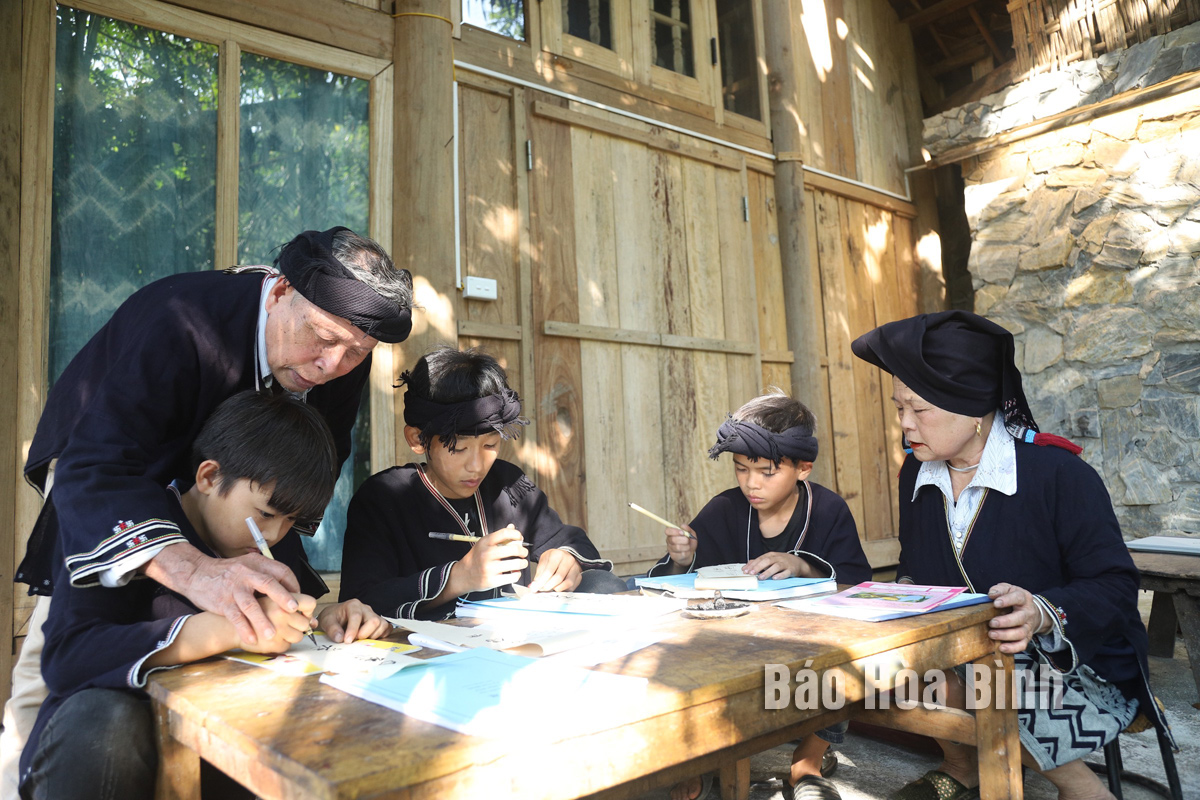
As soon as the Democratic Republic of Vietnam (now the Socialist Republic of Vietnam) was founded, to protect and consolidate the revolution’s achievements, under the Party’s leadership, the provisional Government led by President Ho Chi Minh issued a series of decrees to manage and construct the country.
Notably, Decree No. 65, the first on cultural heritage preservation, was released on November 23, 1945. With regard to the preservation of the national cultural identities, he repeatedly stressed the importance of bringing into the nation’s characteristics. His consistent viewpoint is that the preservation and promotion of the national cultural identities must not be separated from socio-economic development. Following his teachings, people of all ethnic groups in Hoa Binh province, especially artisans, have worked hard to uphold and teach local cultural heritage to help with the national culture prevention and promotion.

Meritorious Artisan Ly Van Henh in Sung hamlet of Cao Son commune (Da Bac
district) teaches the Dao ethnic script to local residents.
To President Ho Chi Minh, preserving the national cultural identities is a
crucial task but the more important is to apply and develop those identities to
life, which is the best way to maintain the national culture. Following the
late leader’s thought, Meritorious Artisan Ly Van Henh in Sung hamlet of Cao
Son commune (Da Bac district) has spent his entire life researching,
preserving, and passing down the culture of the Dao ethnic group to other
people. With the desire to maintain the minority’s quintessence, the
75-year-old is still travelling far and wide to teach the script, language, and
culture of Dao people.
He said the Dao ethnic group boasts a rich culture, from their language,
script, costumes to customs and worship rituals. It is fact that like other
ethnic minorities, the culture of Dao people is facing risk of gradual
disintegration. He thought that one of the best way to uphold the group's
cultural identity is to teach the language and script to Dao children and
adults. A survey once showed that less than one-third of Dao residents in Da
Bac district were fluent in their ethnic group's language, which motivated him
to surmount all difficulties and his old age to continue his path to preserve
and promote the minority's cultural values.
Spending over 50 years studying the Dao culture, Henh not only has in-depth
understanding of the group's language, script, and culture but has also
collected a large number of old books about their folk knowledge, rituals, and
customs. He began teaching the Nom Dao script to his descendants in 1997. After
that, more and more residents in his neighbourhood and nearby areas came to
learn. In 2008, he sought the local administration's permission to teach the
script on a larger scale in Da Bac district. Free classes have been opened in
such communes as Toan Son, Tan Pheo, Doan Ket, and Vay Nua in Da Bac district,
and Kim Thuong of Tan Son district (Phu Tho province), attracting thousands of
learners.
In
addition, Henh has also played an active role in activities of the Centre for
the Sustainable Development of Mountainous Areas, helping preserve and
popularise the cultural identity of Dao people to people nationwide as well as
foreigners.
Thanks to his relentless efforts in cultural preservation and promotion, he was
granted the "Meritorious Artisan" title in the field of intangible
cultural heritage in 2019. In November 2024, he received a certificate of merit
from the Prime Minister for his outstanding achievements in studying and
following President Ho Chi Minh's ideology, moral example, and style.
The Steering Committee for the Development of Science, Technology, Innovation, and Digital Transformation of Hoa Binh province convened a meeting on March 11 to deploy key tasks.
Lac Son district is reorganising and streamlining its organisational apparatus and the contingent of officials, civil servants and public employees in line with Resolution 18 issued by the 12th Party Central Committee.
The provincial Department of Public Security has reorganised its structure to enhance operational efficiency and meet the evolving demands of the new era. In line with the Resolution No. 25 of the Central Public Security Party Committee, the move aims to streamline personnel, standardise leadership roles, and strengthen the police force’s capacity while creating better conditions for modernising equipment.
The subcommittee for documents of the 18th Hoa Binh provincial Party Congress, the 2025 - 2030 term, convened on March 3 to review and incorporate public feedback on the congress’s draft documents. The meeting was chaired by Nguyen Phi Long, an alternate member of the Party Central Committee and Secretary of the Hoa Binh provincial Party Committee. It was attended by senior provincial officials, including Bui Thi Minh, Permanent Deputy Secretary of the provincial Party Committee and Chairwoman of the provincial People’s Council; Bui Duc Hinh, Deputy Secretary of the provincial Party Committee and Chairman of the provincial People’s Committee; other members of the Standing Board of the provincial Party Committee; and members of the document subcommittee.
Muong Bi - Tan Lac, one of the four major Muong ethnic minority-inhabited regions in Hoa Binh, is known for not only its distinctive cultural identity but also its proud history of heroism, with great contributions to the victory against US invaders in the past. Today, Tan Lac district continues to uphold this legacy while embracing development and renewal.
March 3 marked the first official working day for specialised agencies under the provincial People's Committee following the merger or transfer of functions and tasks from the previous agencies. On this day, the newly merged departments and agencies took proactive steps to arrange personnel, organise workflows, and implement tasks efficiently, ensuring that administrative procedures were carried out smoothly without interruption.



